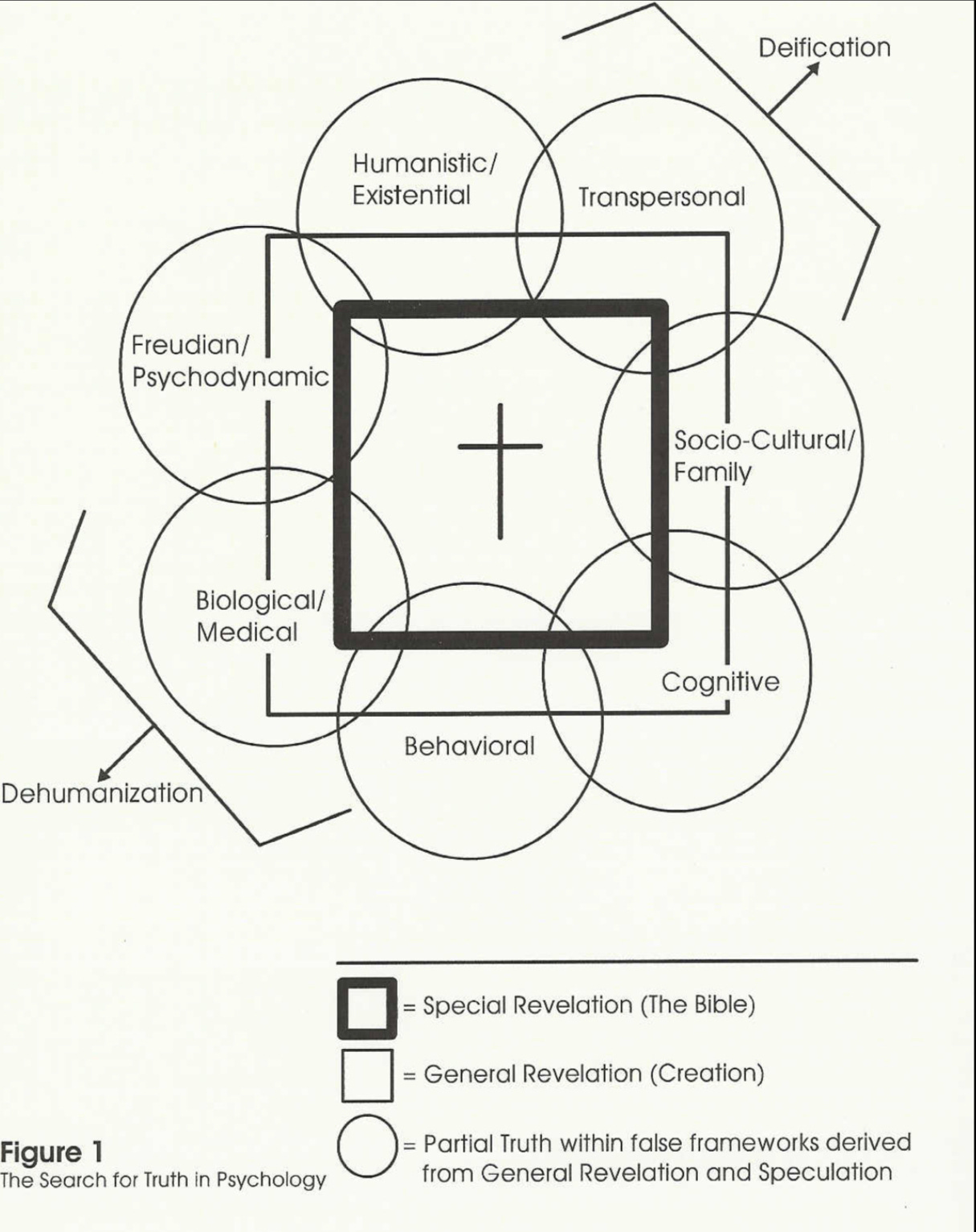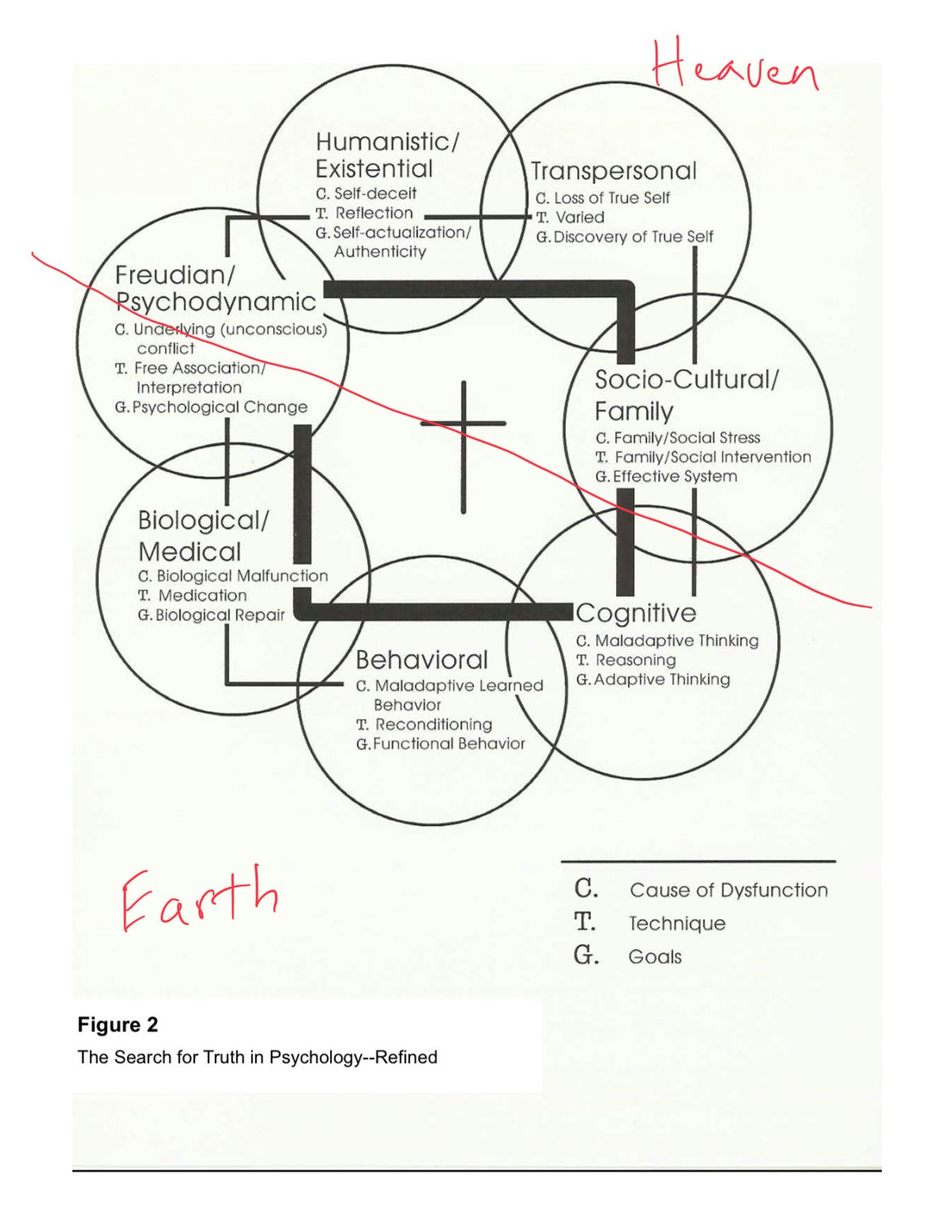Created for Earth and Heaven
“What is mankind?”
Psalm 8:4 doesn’t place the question mark there, but that is the literal meaning of the first two words of that verse.1 It’s an important question, one I find myself asking again as I teach AP psychology. This week I want to share a brief overview of Genesis 1-2 which gives a broad biblical framework for understanding and interpreting how modern science approaches the questions of psychology.
The standard college textbook definition of psychology is “the study of human behavior and mental processes.” With some variance, most textbooks give the following list of the differing approaches to psychology:
-
Evolutionary
-
Biological/Medical
-
Cognitive
-
Behavioral
-
Psychodynamic
-
Humanistic
-
Socio-cultural
While we must always be cautious of reductionism, most if not all psychologists today will acknowledge that these approaches are complementary rather than mutually exclusive. Which begs the question: if these are all distinct but interconnected perspectives, how do we understand them as a whole? How do we bring these perspectives into wholistic perspective?
One of my seminary professors, Richard Winter, created this very helpful diagram to show how the different approaches relate to a Christian worldview:2
On the lower left and upper right corners you’ll see how those perspectives get out of perspective, straying into error. It is appropriate to be wary of how, say, the biological/medical model can reduce humans to mere animals, or how humanism and transpersonalism can lead people to finding deity within themselves.
At the same time, I believe these approaches emphasize two good, creational aspects of humanity which are—in our fallen state at least—in tension. That is, dehumanization and deification are unhealthy and evil extremes of what is otherwise there by God’s design: earth and heaven.
Thanks to my friend Anna Anderson and her brilliantly insightful ThM thesis, Gender as Trinitarian and Eschatological Representation, I am using the first two chapters of Genesis to frame these dual aspects of humanity.
Genesis 1 begins and ends using the phrase “the heavens and the earth.” As the story of creation unfolds in ch. 1, the focus is on the preparation of the earth, and the creation and commission of humanity situated with respect to the earth.
Genesis 2 (which properly begins in 2:4) reverses the order, signaling an emphasis on heaven:
These are the generations
of the heavens and the earth when they were created,
in the day that the LORD God made the earth and the heavens.
This focus on heaven is seen not merely from the switch from “the heavens and the earth” to “the earth and the heavens,” but even more so from vv. 15-17 where God emphasizes humanity’s spiritual/heavenly calling. God sets mankind in the garden of Eden (in Latin, paradisio) to do the same work that priests are commanded to do throughout the Old Testament: minister (work) in the tabernacle/temple and guard (keep) it from the influence of sin. The ultimate aim of this serving and guarding is to arrive at God’s rest, proceeding from God and then returning to him through covenantal image bearing:
God’s heaven-to-earth mission in [Genesis] 1:2-31 is followed by his earth-to-heaven mission. More foundationally, the mission of God in creation as he moves from heaven to earth, and then earth to heaven, manifests the exitus and reditus of his own divine nature, both processions and perichoresis, a dynamic unfolding unto enfolding.3
So, humanity has two points of reference in Genesis 1-2:
-
With respect to the earth: filling it, subduing, having dominion. As Michael Williams puts it, humans are “creatures of the sixth day.”4 Among all of the other creatures that God made, the order of creation in Genesis 1 sets humans in nearest correlation to other creatures made on day 6: “living creatures…livestock and creeping things and beasts of the earth.” Is it any wonder, then, that psychologists can study a variety of animals—whether behaviorally, socially, genetically, neurologically—and produce findings that lead to practical relevance for humans?
-
With respect to heaven: living in communion with God, receiving and trusting his Word, extending his rule throughout earth, serving as priests of God’s kingdom to bring earth and heaven ever nearer until heaven finally comes down as promised in Revelation 21. Is it any wonder, then, that psychology must attend to higher order aspects of humanity, such as relationships, our capacity for language, society and culture, morality, and spirituality?
Here’s how that looks in Dr. Winter’s diagram:
There are many additional doctrines and biblical themes essential to theological anthropology, eg, the image of God, and how that image relates to the orders of creation, sin and grace. How those doctrines relate to this earth/heaven theme is worth additional study. For now, though, I’m going to end with a passage from 1 Corinthians which picks up on those themes. Notice the comparison between the Greek words for soul (psyche) and spirit (pneuma) as it relates to earth and heaven.
1 Corinthians 15:45-49
[45] Thus it is written, “The first man Adam became a living being” [psychen, soul, breath]; the last Adam became a life-giving spirit [pneuma, spirit, wind]. [46] But it is not the spiritual [pneumatikon] that is first but the natural [psychikon], and then the spiritual. [47] The first man was from the earth, a man of dust; the second man is from heaven. [48] As was the man of dust, so also are those who are of the dust, and as is the man of heaven, so also are those who are of heaven. [49] Just as we have borne the image of the man of dust, we shall also bear the image of the man of heaven.
Recommended Listening
The Search for Truth in Psychology and Counseling, by Richard Winter.
Question
Did you take psychology in high school or college? At a Christian school, public school or homeschool? What do you wish your AP psych self would have known or been told or been asked? What questions did you ask, wish you would have asked, or are still asking?
1 https://netbible.org/bible/Psalms+8
2 The Search for Truth in Psychology and Counseling. Presbyterion 31/1 (Spring 2005): 18–36.
3 Anna Anderson, Gender as Trinitarian and Eschatological Representation, unpublished master’s thesis (Union School of Theology, 2023), p. 28.
4 First Calling: The Imago Dei and the Order of Creation—Part 1. Presbyterian 39/1 (Spring 2013), p. 34.

